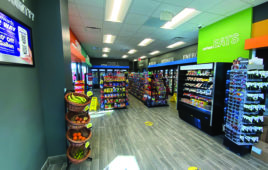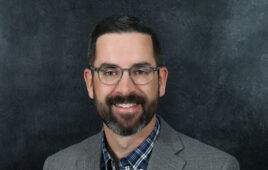Ask any retailer in the industry what sets them apart—what’s their most valuable asset—and almost everyone will say “our people.” But for San Antonio-based-Valero Energy Corp., it’s more than just lip service.
Led by Chairman Bill Greehey, Valero has created a corporate culture that permeates its rank-and-file and makes employees feel like they’re doing more than a job. It’s crafted an atmosphere where every employee, from store associates and managers to refinery workers, feels like they’re part of something bigger than themselves.
A great deal of Valero’s growth into the largest U.S. refiner has come from acquisition (see cover story, p. 22), and many of the refineries it acquired were in disarray, both from an employee and operational standpoint. The company brought in new safety equipment to get the plants back up to speed, and with the improvements came a newfound enthusiasm for the business.
Greehey fostered that excitement by staying in contact with employees, feeding them constant assurances that they would come first—even ahead of shareholders and customers. His message was simple: plant conditions will improve and if they worked hard with Valero, they’d get the best benefits in the industry.
“We’ve found that the more you do for your employees, the more they do for the company, the community and the shareholders,” Greehey said. “Our employees have complete confidence that if they do a good job, then they’ll be a part of our company going forward.”
Valero maintains a no-layoff policy, a dress code for managers and a no-tolerance drug policy. Executives have been fired for being condescending or using profanity when addressing subordinates, and anyone who willfully violates a safety rule is immediately thrown out.
Maybe that’s why the company has been consistently ranked as one of Fortune magazine’s “Best Companies to Work For.” More telling is that 80% of the employees surveyed for the Fortune poll have been with Valero less than four years, thanks to its strategy of growth through acquisition. Yet, they’re still so quickly proud of the part the company plays in their lives and their communities.
Paying the Bills and Then Some
Valero believes in rewarding its employees and recognizing the work they do. It holds a number of social events for its employees—like 2005’s 25th year gala. It also hosts barbecues, safety banquets and golf tournaments to thank employees for the work they’ve done.
While social events are nice, most hard-working associates and laborers would prefer to be thanked monetarily. Valero kept that in mind, too, by implementing a company-wide bonus program.
“We’ve had a lot of acquisition, especially when it comes to our refineries,” said Greehey. “A lot of those refineries had unions in place that didn’t assure them bonuses, but when we came in we made it clear that all of our employees deserve bonuses, which is typically a month’s pay.”
If bonuses aren’t enough, Valero also offers stock options for exempt employees. Greehey feels it’s a great morale booster that makes employees feel more like a part of the company. It’s an even better morale booster when the stock is doing well. The company has affectionately coined the term “Valero-naires,” which are employees who have made $1 million or more with their Valero stock. To date there are 349 Valero-naires when one considers those who have $1 million in their stock options combined with their 401K plans.
But Valero’s corporate culture goes well beyond dress codes and financial incentives. The company has a strong dedication to giving back to its community—not only financially, but with time. The company empowers and encourages its employees to do the same.
“Everyone wants to help other people,-but a lot of companies don’t give their employees a chance to do that,” said Greehey. “We run United Way campaigns in all our offices and we’re consistently the No. 1 company that gives to that organization. Our employees are truly proud of these donations and what they achieve for such a worthwhile cause.”
Valero sees mentoring as a top priority,as well as giving its employees opportunities to volunteer in local communities. The company gives its employees time off to mentor students, who employees are able to follow from elementary school through high school to see how their efforts help develop strong individuals. Valero employees also participate in a volunteer council with a number of employees serving on the board.
“Working as volunteers, they see the needs of the communities first hand and it’s satisfying when they’re able to meet those needs,” said Greehey. “It gives them a sense of personal satisfaction.”
Culture, Not Policy
Like any refinery in a hurricane zone, Valero’s St. Charles facility had a disaster plan. The scope of that plan and, even more, the way it was carried out offers memorable insights into how Greehey’s management formula-is working.
“Our employees came first in our minds. Not only for Katrina, but the same for Port Arthur when Rita hit,” said Greehey. “The Port Arthur refinery was part of our company for only three weeks when Rita blew in, but it was just as efficient and focused on getting back on track as our St. Charles crew.”
As Katrina grew and closed in on the Louisiana coast, Valero knew the storm would be bad, so the company put together groups within the company to cover all aspects of its employees’ needs. It started by purchasing house trailers for employees who might lose their homes to the hurricane. Then it began organizing relief supplies and assistance for employees and their families.
The St. Charles refinery was operational for the bulk of Katrina, with dedicated ride-out crews on hand. According to Jonathan Stuart, St. Charles plant manager, the ride-out crew was made up of 50 volunteers from all departments in the refinery—operations, maintenance, environmental and safety and business services—and was selected ahead of hurricane season. A selection process ensures the company has the best complement of skills represented.
After the storm passed, all of Valero’s preparation and compassion was unleashed on the ravaged St. Charles refinery and its surrounding communities.The San Antonio headquarters began dispatching supplies to aid employees whose homes were destroyed. Trucks from the company’s retail distribution center (RDC) arrived carrying food, water, chain saws, shovels, Nextel phones (the only cell system that worked) and small generators to power lights and refrigerators. The company set up air conditioned tents at the refinery with cooks flown in to make three meals a day for anyone who needed to eat—Valero employee or not.
“We set up a 24-hour hotline for employees to call in,” said Greehey. “All we wanted to know is if they were alright and what we could do to help them. We made sure everything was taken care of for them and told them, ‘Come to the refinery. We’ve got shelter, food and everything you’ll need.’ Almost all of our employees that could came back immediately.”
And when Rita slammed into the Port Arthur refinery, Valero was there to help as well. Even though the refinery was a new addition to the organization, the company didn’t hesitate to step up and help its new family with the same care as its St. Charles team.
Greehey was at the Port Arthur refinery just eight days after the hurricane hit. The company airlifted barbecues in to the refinery—even while the floodwaters were still in place. The night before Greehey arrived, the company flew in portable showers, which got the loudest hoots and hollers from grateful employees. The company also went to a nearby Wal-Mart and bought it out of basic supplies—shoes, pants, soap—and offered the load up to the refinery so its people could take whatever they needed.
“The president of the union at the Port Art
hur refinery said he had never experienced anything like the Valero sharing spirit and what we did for them as a company,” said Greehey. “We got that refinery back up and running in record time, and the employees could immediately see the Valero culture and how we take care of our own. We do that because our employees do so much for us. This is our culture.”
Safe Fund
Because crisis and tragedy can hit at anytime and put a financial strain on families, the company created the Safe Fund, a grant employees can apply for that will give them up to $10,000 based upon their needs.
In the case of Hurricanes Katrina and Rita, Valero was prepared to give out money on the spot. Appraisers arrived on the scene to evaluate damage and write checks. Since a lot of banks weren’t open, the company provided plant managers with cash to take care of the immediate needs of its people.
Valero’s assistance through both storms is almost immeasurable .Through Hurricane Katrina, the company helped 102 employees with $545,000 from the Safe Fund. For Hurricane Rita, $714,000 was spent helping 228 employees, for a total of $1.26 million. Valero provided a total of 350 generators to both plants and 60 Nextel phones so employees could track down loved ones.
Valero didn’t make out so bad, though. Its St. Charles refinery was up and running in just eight days, and it generated $4 million in profits. Port Arthur was equally efficient and profitable, but like everything in the Valero culture, it doesn’t come down to dollars and cents.
“It’s a small amount of profit in comparison to what they did for us,” said Greehey.
Empowering its Own
Valero opened up the St. Charles refinery to all the highway patrol, police and critical service vehicles so they could get what they needed and get back out to help more people. It did the same for the local parishproviding food, water and supplies. Valero used its RDC to deliver to the ravaged areas, which took supplies away from the company’s San Antonio stores.
“It was a financial hit for us not having as much product as we’d usually have in our stores, but it was a priority to make sure our refineries, the employees and the surrounding communities got what they so desperately needed,” said Greehey.
Money was never a thought for Valero. It didn’t consider the cost as long as it was taking care of its employees. It covered hotel bills, rental cars, everything. And when Louisiana residents made their way up to the Houston Astrodome, Valero was quick to send thousands of sandwiches to evacuees.
Plant managers recognized the company philosophy and did a lot on their own because they knew the company would want them to. As an example, it was the plant managers that made the decision to provide emergency gas to everyone.
“Our plant managers did a great job looking out and were empowered to do that,” said Greehey. “We empower our people. They appreciate the trust and freedom, and we appreciate their initiative. I think this hurricane, while tragic and difficult, was our finest hour.”




